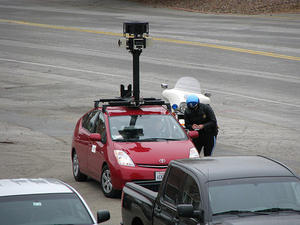Growing privacy concerns over Google's Street View
Worries about the privacy invasion by Google’s Street View project have led several countries to scrutinize the ambitious mapping project; Goolge offers concerned home owners the opportunity to submit a request to have their houses taken off the service, but a Google spokeswoman admits that “Processing these requests and applying blurring is a complex task which takes time”; concerns about privacy infringement were only heightened when it was learned that Google, inadvertently perhaps, also picks up private WiFi communication in the process of updating its maps — and that a Google U.K. executive has purchased a surveillance UAV (he said it was for personal use)

Data gathering being questioned // Source: wikinomics.com
When the Google Street View project began in May 2007, only five cities were involved in the effort to “organize the world’s information geographically” by combining thorough imaging with precise GPS data. Google’s Web site declares that the current platforms of technologies used on their Street View vehicles have “nine directional cameras for 360 degree views, a GPS unit for positioning, and laser ranger scanners.” There is no mention, however, of WiFi hotspot receivers, which brought Google’s Street View mapping into question on 14 May 2010 when the company had notified the public of having inadvertently intercepted private information.
Google continues to draw public scrutiny through the purported decision of an executive to purchase an unmanned aerial vehicle (UAV) spy drone for “personal purposes.”
The Street View vehicles were fitted with antenna designed to locate and capture details of WiFi hotspots, but had also captured payload data (information sent over WiFi networks). The French data protection authority, Commission Nationale Informatique et Libertes (CNIL), an independent administrative body established by a law relating to data, files, and freedoms, after having inspected Google’s street view data, found that passwords to e-mail boxes had been collected. Their report also indicates that the CNIL is the first Data Protection Authority (DPA) to search through Google Street View data.
Google remains under investigation by the U.K. Metropolitan Police for their possible breach of the Regulation of Investigatory Powers Act (RIPA) or the Wireless Telegraphy Act, which allows Parliament to regulate the powers of public bodies to carry out surveillance and investigation, and also covers the interception of communications. The Information Commissioner’s Office stressed earlier on that its investigation was limited to a review of data samples only and was not a detailed analysis of all the WiFi data collected by Google and has recently stated that it had no powers to investigate Google for any alleged illegal interception, which is ultimately controlled by (RIPA).
In other parts of the world there is also concern over the invasion of privacy. In South Korea, police raided Google offices and offered their comment: “We intend to find out what kinds of data they have collected and how much,” the response center said. “We will try to retrieve all the original data illegally collected and stored through domestic Wi-Fi networks from the Google headquarters.” Google has agreed to cooperate with similar investigations around the globe.
Stephen Conroy, Australia’s minister for broadband communications
